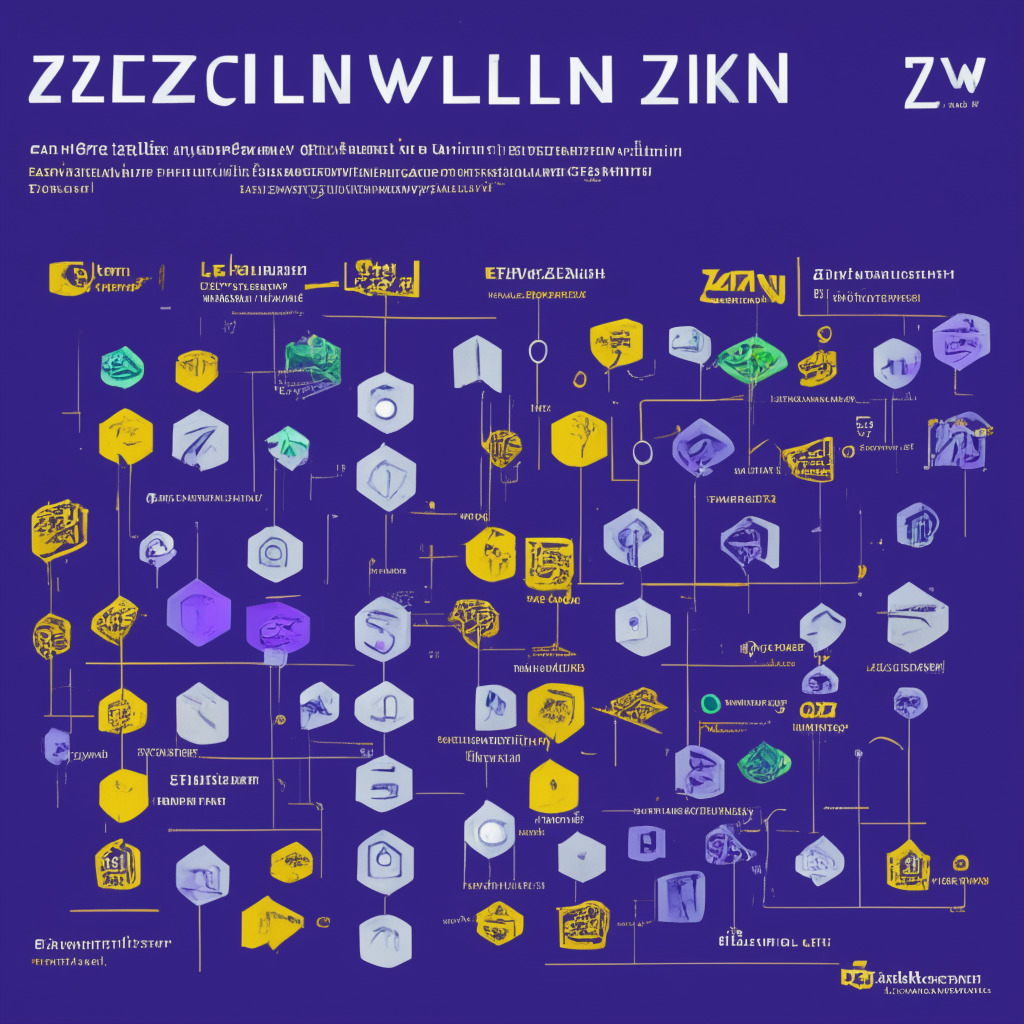Polygon Labs announces its journey towards Polygon 2.0, aiming to boost the Ethereum blockspace and promise limitless scalability. While Ripple Labs extends its Liquidity Hub, offering improved customer experience, questions arise around potential legislative challenges. Developments in crypto legalities and ethical dilemmas in blockchain transactions continue to make the space more dynamic.
Search Results for: Polygon 2.0
Unveiling Polygon 2.0: Scaling Ethereum’s Future or Shaking Its Foundation?
Ethereum layer 2 developer, Polygon Labs, commences Polygon 2.0 ecosystem aimed at establishing an interconnected Ethereum system with high throughput and low fee transactions. This ecosystem evolution highlights the adaptability of blockchain technology but raises questions about the impacts on established contracts and practices.
Decoding Polygon 2.0: A Democratic Overhaul towards Decentralized Blockchain Governance
“Polygon 2.0 is an ambitious project aiming to democratize blockchain governance through community participation. The project proposed the overhaul of the existing governance mechanism, planning to install several layer-2s backed by a comprehensive governance structure. These changes look to promote community involvement, streamline upgrade implementations, and establish a Community Treasury for ecosystem growth.”
Polygon 2.0: zkEVM Validium Upgrade for Improved PoS Chain – Pros, Cons, and Conflict
Polygon Labs proposes upgrading its proof-of-stake (PoS) chain to a zkEVM validium to improve security and performance. The upgrade addresses issues like fast block times affecting gas estimation and chain reorgs while integrating zero-knowledge proofs into the infrastructure. Implementation is expected by Q1 2024 if accepted.
Polygon 2.0: Unleashing Unlimited Scalability and Bridging Crypto’s Gaps in a Troubled Market
Polygon 2.0, an Ethereum-based Layer-2 scalability solution, aspires to democratize the global economy by creating a user-centric, equitable internet experience. However, uncertainty looms due to the SEC ruling on its native cryptocurrency, MATIC. The new iteration focuses on unification, infinite scalability, and leveraging Zero-Knowledge technology for seamless interaction.
The Arrival of Polygon 2.0: Transforming Internet & Blockchain with ZK Technology
Polygon Labs announces “Polygon 2.0,” a set of upgrades designed to establish the “Value Layer” of the internet, enabling users to create, exchange, and program value online. Powered by Zero-Knowledge (ZK) technology, Polygon 2.0 aims to support limitless chains and seamless cross-chain interactions, potentially transforming internet use and blockchain integration while facing regulatory challenges.
Polygon 2.0: Navigating Global Regulatory Hurdles and Community Control Challenges
Polygon unveils its upcoming project, Polygon 2.0, focusing on development and deployment outside the US amid a tough regulatory environment. With the aim to attract the global community’s attention, Polygon 2.0 will be a network of ZK-powered L2 chains, emphasizing community-driven decisions and facing challenges from US regulatory crackdowns on digital assets.
Polygon 2.0 Blueprint: Exciting Potential or Cause for Concern in Blockchain Evolution
The upcoming Polygon 2.0 blueprint announcement, focusing on topics like future PoS chain, token utility, and community governance, could significantly impact blockchain technology. However, healthy skepticism is warranted as competition with Ethereum and potential internal conflicts pose challenges.
Navigating Change: The Dynamic Shifts in Polygon’s Leadership and Impact on Blockchain Future
“Polygon, a renowned Ethereum layer 2 scaling solution, is entering a new phase of development, marked by significant shifts in its leadership. Co-founder Jaynti Kanani steps back, while Marc Boiron becomes CEO, in sync with Polygon’s transition to Polygon 2.0, which bring substantial technological innovations in blockchain systems.”
Google Cloud’s Role as a Polygon Validator: Implications and Confrontations in Decentralization
Google Cloud’s partnership with Polygon, an Ethereum Layer 2 protocol, strengthens the growing trust in blockchain’s role in our digital future. Google’s entry as a validator bolsters security, and implicates its infrastructure employed by high-traffic platforms, as part of web3 collaborations.
Enhancing Blockchain Security: A Deep Dive into OpenZeppelin’s Defender 2.0
OpenZeppelin, a pioneer in blockchain security, revealed Defender 2.0, a security enhancement specifically for blockchain communities that integrates a security audit into blockchain-based algorithms, mitigating potential cybersecurity vulnerabilities in creating secure decentralized applications. It’s aimed to strengthen smart contract security from development to deployment.
Palm Foundation’s Move to Polygon Supernet: Innovations in NFT Infrastructure and the Path Ahead
Palm Foundation, with support from Polygon Labs and Consensys, is developing a Polygon Zero Knowledge Supernet to simplify onboarding and expand its NFT infrastructure. The plan includes addressing governance through Decentralized Autonomous Organizations and enhancing transaction speed while maintaining low gas fees. The initiative, targeting broader Web3 user-base, will complete its migration to a ZK Supernet by 2024.
Exploring Polygon Labs’ Bold Governance Overhaul: Embarking on a More Democratic Future?
Polygon Labs plans to restructure the governance of its upcoming Polygon 2.0 roadmap. The system will be based on three primary pillars: democratization, System Smart Contracts Governance, and Community Treasury. Each pillar allows for community involvement and transparency, aiming to create an ecosystem that is community-driven and encourages progress in the technological landscape.
Unveiling the Mystery Behind the Unexpected Surge in Polygon’s Value
The recent surge in MATIC’s price after a landmark court ruling dismissed it as a security, coupled with significant growth in decentralized applications (Dapps) on the Polygon Network, suggest potential for a rebound. However, the proposed token upgrade and competition from networks like Arbirtrum and Optimism imply that investors should proceed with caution.
Unraveling the Intricacies of Polygon’s Token Strategy: Maturing from MATIC to POL
Polygon, an Ethereum scaling solution, plans to change its native token from MATIC to POL. Touted as a “3rd generation token”, POL optimizes user experience across the protocol’s layer 2 ecosystem and enables holders to earn rewards as validators across multiple chains. This change prompts validators to embrace multi-chain roles, yielding varying rewards and potentially significant benefits.
Power Plays in Crypto: Polygon Labs Leadership Transition Amidst Blockchain Evolution
“Leadership transitions in digital currencies have ripple effects, potentially impacting the organization and the crypto space. Recently, Polygon Labs’ president, Ryan Wyatt, announced his departure, with Marc Boiron, the existing CLO, assuming the CEO role. These changes coincide with Polygon’s planned upgrades under ‘Polygon 2.0’, aimed at decentralizing governance.”
Navigating the Future of Blockchain: Polygon’s Leadership Changes and Technological Shifts
Polygon Labs, known for its innovative blockchain efforts, has initiated strategic leadership changes, aligning with their transition towards “Polygon 2.0”. Devoting efforts to unifying Polygon chains via a “coordination layer”, they also plan to upgrade their legacy “PoS” chain for a compatibility with zero-knowledge proofs, advancing their commitment to confidentiality of transactions while bearing potential complexities and security risks.
Polygon PoS Upgrade to zkEVM Validium: Security vs Scalability vs Decentralization Debate
Polygon co-founder Mihailo Bjelic proposes an upgrade to the Polygon PoS network, suggesting a shift to a “zkEVM validium” version for increased security through zero-knowledge proofs. This upgrade would enable Polygon zkEVM for high-value transactions, offering lower fees and enhanced security from Ethereum’s features, targeting applications like Web3 gaming and social media.
Exploring Polygon PoS Upgrade to zkEVM Validium: Scalability, Security, and Future Prospects
The Polygon Labs engineering team proposed an upgrade to Polygon Proof-of-Stake (PoS) sidechain, transitioning to ‘zkEVM Validium,’ an Ethereum-secured Layer 2 network secured by zero-knowledge proofs. Targeted for Q1 2024, this upgrade aligns with Polygon 2.0’s vision and aims to enhance scalability, security, and interoperability within the broader cryptocurrency ecosystem.
Polygon’s ZK Technology Upgrade: Boon or Bane for Blockchain’s Future?
Polygon aims to make its primary chain compatible with zero knowledge (ZK) technology, potentially transforming it into a zkEVM validium and ensuring Ethereum Virtual Machine compatibility. This upgrade could enhance security, eliminate reorgs, expedite transactions, and scale the blockchain more effectively. However, the complex integration may introduce unforeseen challenges.
MATIC Price: Navigating the Resistance and Key Support Levels Amid Volatility
MATIC price faces renewed bearish momentum, with investors watching if it will retest the $0.51-$0.5 support. With Polygon 2.0’s release, MATIC price rose 2.5% while intraday trading volume increased by 28.5%. High market volatility is expected, making it essential for traders to monitor key levels and conduct thorough market research.
Exploring the Dynamics of Blockchain: Kanani’s Transition and FTX’s Downfall
Jaynti Kanani, a key figure in the Polygon project, has decided to take a step back from his operational duties, contributing from a more relaxed standpoint instead. Meanwhile, the crypto world witnessed the collapse of FTX cryptocurrency exchange, underscoring the volatile nature of digital currencies and emphasizing the importance of transparency and checks and balances.
Bitcoin’s Resurgence and Emergence of TG.Casino: A Double Whammy in the Crypto World
“Polygon has seen a 17% increase in high-value transactions, in line with the unveiling of key governance proposals. However, its Relative Strength Index indicates potential need for consolidation. Additionally, TG.Casino emerges as an exciting entity, linking casino industry with decentralized blockchain capabilities, offering both opportunities and challenges in the cryptocurrency future.”
Crypto Competition Uptick: Web3 Wallet Suku vs Twitter’s Vision for Crypto Payments Integration
Web3 wallet Suku is integrating with Twitter to allow users to easily send digital currencies and non-fungible tokens (NFTs). It aims to simplify the crypto onboarding process, bypassing the need to connect a wallet. Furthermore, Suku plans to integrate with other social media platforms, striving to create a decentralized payment system that works across various platforms. Despite the challenges, crypto payments on social media are on a promising trajectory.
Blockchains Future: A Tale of Innovation, Regulatory Challenges and Intensified Crypto Adoption
“The future of blockchain technology is promising yet complex, as seen with events like Litecoin’s robust performance, Polygon’s proposed token nomenclature revision, and regulatory challenges worldwide. Developments like Coinbase’s secure messaging system and Google Play’s digital asset integration highlight the merging of conventional institutions with blockchain, while caution remains due to persistent crypto scams.”
SEC’s Labels Impact ALGO and FLOW: Analyzing Market Reaction and Crypto Resistance
The SEC’s decision to label several cryptocurrencies as securities resulted in historic lows for Algorand (ALGO) and Flow (FLOW) on June 10. Despite opposition from projects like Solana, Cardano, and Polygon, the crypto market thrives, but ongoing debates may create volatility for investors.
Crypto Market Resurgence Amidst Crackdowns: A Sign of Resilience or Temporary Relief?
Cryptocurrencies are experiencing a resurgence, with Bitcoin and Ethereum up 3.7% and 3.6% respectively. Major and minor altcoins gain amid SEC clampdown on unregulated securities, while market shows resilience despite ongoing regulatory uncertainty.
SEC Lawsuit Vs Binance: Crypto Market Uncertainty and the Rise of Sustainable Alternatives
The SEC’s lawsuit against Binance categorizing cryptocurrencies like Cardano, Solana, and Polygon as unregistered securities has cast a shadow on the crypto market. Cardano’s founder, Charles Hoskinson, suggests this is part of “Operation Choke Point 2.0” aiming to centralize financial control. Investors are now considering alternative investments, such as Ecoterra, amidst regulatory uncertainty.
US Default Averted: Market Optimism Fuels Crypto Rally and Debate on Future Prospects
US futures surged on Thursday as the House of Representatives passed a crucial deal averting a dangerous US default. Combined with hints of a pause in interest-rate hikes, this sparked optimism in the market. Positive trends were observed in S&P 500, Dow Jones Industrial Average, and Nasdaq Composite futures, while tech-heavy Nasdaq experienced a slight setback. The broader cryptocurrency market may also be impacted by this development.
Unexpected Bitcoin Drop & Rising Meme Coins: Analyzing Market Shifts and Investment Opportunities
Bitcoin experienced a significant drop falling below $27,000, linked to a massive transaction from the U.S. government’s wallet. Cryptocurrencies such as AI, BSV, SPONGE, LDO, ECOTERRA, SUI, and SWDTKN stand out for investment consideration based on strong fundamentals and/or positive technical analysis.
Crypto Market Optimism Amid Fed Announcement: Analyzing Risks and Effects on Traditional Finance
The crypto market displays optimism as total market cap surpasses $1.18 trillion, with Bitcoin and Ethereum showing stability amid anticipation of the Federal Reserve announcement. However, potential risks include regulatory scrutiny, environmental concerns, and global economic events.
Layer-2 Blockchain Revolution: Unveiling Starknet’s 2023 Roadmap, Throughput, and Scalability
As layer-2 blockchain protocols gain momentum in 2023, Starknet’s ambitious roadmap plans to help the […]































